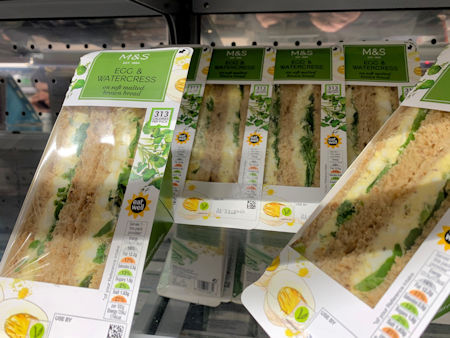Recycling Association chief executive, Simon Ellin, has welcomed two of the recent OPRL labelling changes to ‘Recycle’ or ‘Don’t Recycle’ but has raised concerns that one consequence of the changes could lead to contamination of the plastic recycling stream.
Among the detailed changes made to its labelling scheme, OPRL (the On-Pack Recycling Label organisation) has tightened up the tolerances for plastic materials attached to paper/card (such as sandwich wrappers).
OPRL says: “Coated paper and card quality tolerances immediately tighten up to a maximum of 15% plastic by weight for Recycle status and reduce further to 10% in January 2023, giving markets time to respond.”

Permitted polymer types for recycling could cause contamination under OPRL plans, warns The Recycling Association
Tolerance
Dr Ellin, who has long campaigned for less mixing of materials in packaging (such as in Pringles tubes) said: “For our members, the decision that coated paper and card products have a 15% plastic tolerance and 10% tolerance by 2023 should have been more ambitious… this doesn’t even meet the Confederation of Paper Industries and WRAP guidelines on laminates. With innovations in packaging technology over the next few years, we should aim to get this down to zero lamination as soon as possible.”
He added: “While it is mostly positive that three polymer types move from Check Locally to Recycle and PVC and PS will be in Don’t Recycle, there is a risk that some of the permitted polymer types include products such as sandwich boxes that are hard to recycle. We need to be very careful that this does not lead to much greater contamination of the plastic recycling stream.”
Plastics collections
On a more positive note, Dr Ellin said: “However, this choice of three polymers does provide clarity to the consumer, but also means local authorities can have standardised plastic collections, and manufacturers have a list of standard polymers to use. It does require both to make rapid strides to ensure that quality is put first.
“With Recycle meaning that ‘75% of local authorities collect that type of packaging which is then effectively sorted, processed and sold as recyclate for use in new packaging or products’, we would urge those that are in the 25% to match their counterparts and effectively standardise core material collection. That way, this commendable work from OPRL will mean consumers all over the UK can recycle their packaging at home in confidence.”
The post Ellin raises plastics concerns amid label changes appeared first on letsrecycle.com.
Source: letsrecycle.com Plastic


